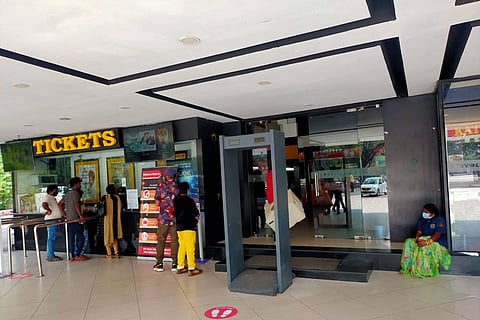

While the Andhra government and Tollywood are at loggerheads over the reduction of movie ticket prices, theatre owners say that they are facing the actual brunt of the reduction, especially in the semi-urban and the rural areas, which are considered as B and C centres, respectively. As per the Government Order number 35, which was released by the Andhra government on April 8, 2021, the ticket rates have been revised based on the area in which the theatre is located.
“It is impossible to run theatres at such low ticket prices, hence we have requested the government to revise the ticket slabs in the B and C centres at least, and we think our concerns would be heard favourably,” M Ramadas, the vice president of Andhra Film Chamber of Commerce, tells TNM. Ramadas is also one of the members of the committee that is slated to release its report on whether ticket prices will be increased after a round of meetings on the ticket pricing issue with the concerned officials.
The committee meetings are being held this month in Vijayawada between stakeholders and the government, with theatre owners pushing for a change in the ticket slabs at these centres.
For example, in an AC theatre located in a Nagara Panchayat Area an economy ticket costs Rs 15 and a deluxe ticket Rs 35. In 2013, when prices were last revised, the tickets were priced at Rs 10 (economy) and Rs 45 (deluxe), respectively.
AP Government Mandated Ticket Prices!. Most Towns will be following these prices. (Unless B-Form has higher prices already sanctioned) pic.twitter.com/91q5OPshxE
— AndhraBoxOffice.Com (@AndhraBoxOffice) December 1, 2021
In this way, the prices vary according to whether a theatre is located in a Municipal Corporation Area, Municipality Area, Nagara Panchayat Area and Gram Panchayat Area. The ticket price also changes depending on if it is a multiplex, AC or non-AC theatre.
The GO was challenged in the High Court by the theatre owners in December, and the High Court had issued a stay order and advised the government to form a committee to discuss the issue and resolve it.
Issues faced by theatre owners
The main grouse theatre owners have is how can they afford to spend on maintenance when the ticket prices are reduced and thereby their revenue. They question that if electricity costs the same everywhere in the state, how can there be different slabs when it comes to ticket pricing based on location.
“The minimum power bill for a theatre is Rs 60,000 whether it is running or not. In AC theatres this can go up to Rs 1.5 lakh to 2 lakh,” says Shaik Shahjahan, who owns Krishna Theatre in Ongole.
Even when it comes to taxes, he says that there isn’t much difference in the amount that has to be paid depending on the area where the theatre is located. “Then why is there a difference in theatre ticket prices in various centres,” he questions.
He further adds that at a time when the cost of living is increasing, ticket prices have been reduced and have returned to the price it was a decade back. “We request the government to give us scope to increase the ticket pricing so that theatres can sustain,” adds Shajahan.
Many theatre owners say that they have had to upgrade facilities and renovate their theatres to keep up with the times and offer their customers comfort. “Because of public demand, several theatres in B and C centres have been renovated, but with the decrease in theatre prices how are we expected to maintain theatres? It is not possible at such low prices,” says Srinivasa Babu, president of Vijayawada Exhibitors Association, who owns about five theatres in Andhra.
A theatre manager in Pedana municipality in Krishna district, who does not want to be named, says that many of the theatres are just recovering from the 18 months of closure that occurred in the state due to the coronavirus pandemic.
“It costs about Rs 5,000 per day to maintain a non-AC theatre in a rural area. And we see profits during the festive season or on the weekends, the rest of the days are dull. Many times, the theatre remains closed as there won’t be a minimum number of people in the audience,” he adds.
Theatre owners say that the maintenance costs of a theatre range from Rs 1.5 lakh to Rs 6 lakh, depending on the size and whether it is AC or non-AC. This includes the electricity bills, staff salary and other taxes. Each theatre has about 20 people working in it, from those issuing tickets to cleaning staff. Now, with online tickets, theatre owners say they will have to recruit one more person, who has the ability to operate the software.
Meanwhile, because of COVID-19 and the lack of big movie releases, about 200 theatres out of 1,100 that the state has have remained closed since the first lockdown, according to the Film Chamber of Commerce in Andhra Pradesh.